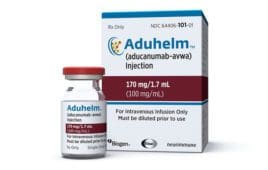
Image by Gerd Altmann from Pixabay
Biogen’s (NSDQ:BIIB) Alzheimer’s drug Aduhelm (aducanumab) continues to be a source of contention. Advocates cite the need for a new therapy for the memory-robbing disease while skeptics remain unconvinced about the benefit-risk profile of the drug.
Most recently, Alzheimer’s disease advocates have criticized Medicare’s proposal to constrain coverage for the drug to clinical trial participants.
The patient groups the Alzheimer’s Association, UsAgainstAlzheimer’s and the Global Alzheimer’s Platform Foundation have vowed to help overturn that decision by reaching out to the U.S. Health Secretary, lawmakers and officials within the Biden administration.
The proposal would also apply to similar monoclonal antibodies that target the peptide amyloid-β (Aβ) and the protein tau to target Alzheimer’s.
The Centers for Medicare & Medicaid Services (CMS) proposal is “very problematic,” said John Dwyer, president of Global Alzheimer’s Platform Foundation (GAP), in a statement posted on YouTube. CMS’s proposal to drastically limit coverage of aducanumab is “unprecedented” and “discriminatory,” Dwyer said.
“The decision by the Centers for Medicare & Medicaid Services (CMS) is shocking discrimination against everyone with Alzheimer’s disease,” said Harry Johns, Alzheimer’s Association CEO, in a statement.
FDA’s decision to approve the drug was also controversial, prompting three members of the agency’s Peripheral and Central Nervous System Drugs Advisory Committee to resign last year and federal investigations.
Biogen’s initial plan to price Aduhelm at about $56,000 annually per patient sparked concern about the cumulative cost to Medicare’s budget. However, Biogen later cut the price to about $28,200 annually.
A number of drug developers such as Eli Lilly (NYSE:LLY) and Biogen collaborator Eisai (TYO:4523) continue to develop antibody-based Alzheimer’s drugs.
Filed Under: Neurological Disease



